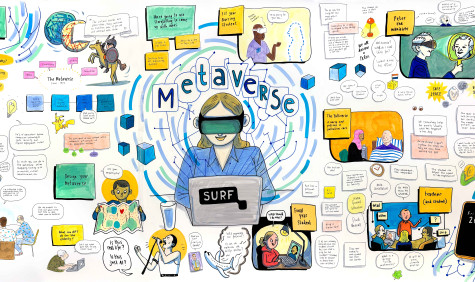Discovery of the "Metaverse"
Intro to the Metaverse
When asked what people's associations are with the concept of the Metaverse, terms like virtual worlds, Second Life and Meta quickly come to mind. Going back in time, it is Neal Stephenson who first introduced the concept in 1992 in his science fiction book "Snow Crash". From the beginning of this century, it continued to take shape in the gaming industry through popular games such as Second Life, Oculus Rift and Pokémon Go. That the Metaverse is becoming increasingly serious is evidenced by the fact that the European Union, in its vision of virtual worlds this year, expects 860,000 jobs in XR by 2025 with growth of 800 trillion euros by 2030. Partly the result of multiple activities coming together in the metaverse: gaming, education, shopping, social media, workplace, etc.
Scenario building: thinking out of the box about the future
The timeline for when the Metaverse will be mature is a point of confusion, fuelled by the discussion on what exactly a mature Metaverse will look like. In short, there is plenty of room for idea and scenario formation in the current phase. In the Metaverse workshop, members from secondary vocational, higher vocational, university and health institutes enthusiastically set to work with each other to think out future scenarios based on a concrete "persona". Various techniques and models were used to feed the inspiration.
Storytelling brings the Metaverse to life
The ultimate goal of this futuring workshop was to actually bring the Metaverse to life. Through describing a day in the future from the life of the chosen persona, the concoctions were presented to each other. Five presentations summarised:
1. A care worker in palliative care sees her distances to cover and stress reduced because in the "palliverse" her schedule is optimally aligned with the actual needs of her clients
2. A nursing student does his internship partly in a safe, virtual world where he follows exactly the modules he needs to learn about the hospital world via almost lifelike scenario training.
3. An innovation manager at the university takes -both in terms of organisation and budget- cautious steps towards the Metaverse by starting a pilot to allow students to work more interactively and internationally
4. An instructor sees his role shifting to more of a learning designer, as students virtually -partly AI-controlled- follow their own learning path and pace and can easily take other classes via microcredentials. Intervision easily takes place with other institutions within the Netherlands and worldwide.
5. A student constantly has a personal AI mentor at his/her disposal to help them make decisions about their choice of study and other dilemmas. This combined with interactive feedback moments with other students in the same situation.
In short: plenty of food for thought about which direction our sector could take in the future! Workshop participants indicated that - besides the dialogue with each other - they found the approach with end-users in mind very refreshing.
Next Tech Trends workshop
The next Tech Trends workshop is scheduled for 27 February 2024. Keep an eye on the SURF agenda!
More information?
Download the special Metaverse report or get in touch.
